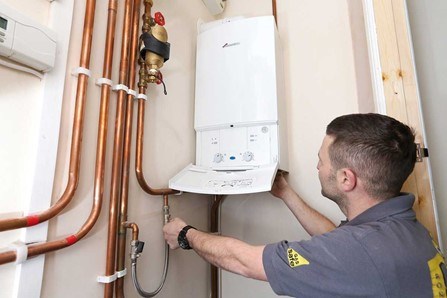This is our ‘Beginners Guide’ or ‘Dummies guide’ to the different types of gas boiler systems. Nowadays all new boiler systems are energy-efficient, so choosing the right boiler is really about what is most practical and efficient for your home and usage requirements.
Since 2010, all boilers must be A-rated for energy efficiency, (or at least 88% efficient and rated by the SEDBUK (Seasonal Efficiency of Domestic Boilers in the UK) to determine the energy efficiency of the system. This is useful in helping pick between the wide range of boiler models available and find one that is both energy efficient and suitable for your home.
Choosing the right boiler for your heating system will depend on the size of your property, the number of rooms, baths and showers. Our expert heating engineer will be able to offer you advice on the most efficient heating system and boiler for your property and usage requirements.
There are 3 main types of boiler system:
- Combination Boilers
- System Boilers
- Conventional Boilers
What is a condensing boiler?
Condensing boilers can be combi, system and conventional boiler systems – this is because it is an attribute all boilers can have which makes them very energy efficient. By condensing it means that the boiler captures much of the heat that would otherwise be lost via the flu and re-uses it, and in doing so improves its energy efficiency and saving you money on your heating bills.
Combiination / Combi boilers
- Compact and ideal for small properties
- No hot/cold water tanks
- Less pipework
Combination Boilers, often referred to as ‘combi boilers’, are the most popular type of boiler in the UK. Combination boilers are energy efficient because they heat water directly from the mains water supply as and when you turn on a tap or shower. This means that they can provide unlimited heating and hot water rather heating water and storing it, so there is no need for a hot water tank or cylinder in a cupboard or in your loft. Combi systems use mains water pressure, so they provide good water pressure without the need for a pump. They are most suited to a household where there are one or two bathrooms and where there is not a high demand for hot water to be used at the same time.
System Boilers
- Ideal for Homes with 1+ bathrooms
- Constant Hot Water
- No Tank + built in components
System boilers, also known as a ‘sealed system’, require a cylinder for storing hot water, which is usually placed in an airing cupboard or the loft. The main heating components are in the boiler so there is no need for a water tank in the loft. These boilers are often used in homes with loft conversions and are suitable for properties where you need to run hot water for multiple uses around the home at the same time. Although they do not provide instant hot water and they can run out of water, meaning you will have to wait for it to reheat.
Conventional Boilers
- Multiple Hot water usage
- Ideal for 2+ bathrooms
- Suitable for Low Water Pressure
Conventional boilers, sometimes known as ‘heat only’ ‘regular boilers’ or ‘open vent’ systems are usually installed with a hot water cylinder in an airing cupboard fed by a cold water tank in the loft. These types of boilers provide stored hot water and are suitable for properties where you need to run hot water from multiple taps or showers at the same time. These systems are often used in properties with more than one bathroom and where a lot water needs to be used at the same time. They are suitable for low water pressure or with old heating systems, where the higher water pressure provided by combi or system boilers may be too much.
How to choose the right boiler for your home?
We offer free professional advice
There are also a huge variety of boiler manufacturers offering a range of models to choose from. In order to choose the right boiler for your home there are many factors to consider in terms of the type of boiler and performance requirements, before you can consider specific models that may be most suitable.
It is of course important to consider both the existing central heating system, your usage requirements, as well as any improvements that you may wish to make to your hot water and heating system, such as smart heating controls as you will need to make sure the new boiler needs to be compatible with those too.
As part of planning a replacement boiler or central heating installation our heating engineers will first assess the household before making any recommendations on boiler type and models to suit your requirements.
